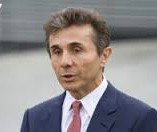
TBILISI, DFWatch–Former Prime Minister Bidzina Ivanishvili says he once planned to arrest Kadagidze due to ‘personal’ business, but changed his mind by request of representatives of the International Monetary Fund (IMF).
The revelation comes after weeks of criticism by the government against the head of Georgia’s central bank.
Ivanishvili, who officially left politics a year and a half ago but is believed to still be ruling the country from behind the scenes, on Thursday recalled details of a closed meeting he had with IMF representatives while he was prime minister. During the meeting, he said that the takeover of Cartu Bank was a ‘personal’ issue but that he could ‘forgive.’
“The issue of Cartu Bank was personal. IMF representatives also knew that he violated the law, but they never said that Kadagidze shouldn’t be arrested. “We know that he has to be arrested, but maybe you could forgive him,” Ivanishvili recalled. “I told them, what is personal, I can do, and suspended the proceedings of the appeal at the Prosecutor General’s Office. [Former Cartu Bank director Nodar] Javakhishvili was disappointed, but the one who asked, and to Kadagidze I explained that if he committed violations against the state, I couldn’t hide him.”
After Ivanishvili first entered politics, the government of Mikheil Saakashvili brought in tougher rules for party financing which created difficulties for Ivanishvili to realize his political goals, including fines totaling USD 80 million. At first, Ivanishvili refused to pay the fines, which is why 100 percent of his shares in Cartu Bank, 100 percent shares in Cartu Group and part of his shares in Progress Bank were seized. The government appointed its own representative to manage the seized shares in Cartu Group and Progress Bank.
Later Ivanishvili paid the fines, saying that he was giving this money to the people affected by a flood, but as soon as he came to power the money was returned to him from the state and his representative took control over of Cartu Bank.
However, Ivanishvili never kept it secret that he was resentful toward the National Bank president, as the removal of the head of his own bank happened through interference by the National Bank.
Under Georgian law, parliament selects a National Bank president from the bank’s steering board, the members of which are appointed by parliament among candidates presented by the Georgian president. A National Bank president is appointed for a seven year term, so Ivanishvili was not able to dismiss Kadagidze as long as he didn’t commit a criminal offence.
In recent months, as the national currency has fallen in value, Ivanishvili and government members began criticizing Kadagidze, blaming the economic crisis on him.
Two days ago, the deputy chief prosecutor said that the office is investigating the activities of the National Bank and he didn’t rule out that Kadagidze may be summoned for questioning about the depreciation of the lari.
Later, Ivanishvili said that while he was in office he considered arresting Kadagidze. This was criticized by lawyers and political opponents who said that Ivanishvili was only proving that law enforcement bodies and the Prosecutor General’s Office are acting on his orders and based on his personal interests.
The ruling coalition, however, cannot see such a problem. According to them, Kadagidze has a lot to answer to.
IMF representative to Georgia Azim Sadikov responded in a letter Friday that the Fund cannot take a view on the issues related to justice and a person’s relations with the law.
‘This is not our mandate.’
The statement also says that violating the independence of the National Bank would weaken the institution, undermine the credibility of its monetary and financial sector policies and threaten investor confidence.
Sadikov also expressed concern about the recent initiative by the government to amend legislation and take away the National Bank’s responsibility for monitoring the banking system.
“We recommend that proper consultations with key stakeholders and international experts take place now. If these consultations result in proposals to amend the central bank law, any amendments should preserve the independence of the NBG and ensure that its governance and operations are in line with international best practice,” the statement reads.
However, in his statement Ivanishvili said that the new initiative of depriving banking supervisory functions from NBG will only increase ‘the independence of banks.’

